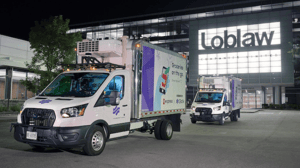EASY MONEY
As long as they have plenty of hungry office workers in the neighborhood, supermarkets will make money on catering programs.That was the consensus, anyway, among retailers interviewed by SN. In a spot check around the country, SN found many independent chains reporting strong returns on the catering programs they operate as part of the deli and food-service departments."Catering is the most profitable
October 16, 2006
ROSEANNE HARPER
As long as they have plenty of hungry office workers in the neighborhood, supermarkets will make money on catering programs.
That was the consensus, anyway, among retailers interviewed by SN. In a spot check around the country, SN found many independent chains reporting strong returns on the catering programs they operate as part of the deli and food-service departments.
"Catering is the most profitable part of the deli," said Richard Travaglione, vice president of perishables, at 11-unit Morton Williams Associated Supermarkets, based in the Bronx in New York City. "In fact, it's the best moneymaker in the entire store."
He and other retailers emphasized that the right demographics - preferably office buildings nearby - are essential for a successful program. Simplicity, flexibility and well-established lines of communication between the fresh food departments are also key ingredients, retail sources said.
"My produce managers automatically bring items a little past their selling peak to the kitchen. If it's bell peppers, we may feature pepper and onion omelets," Travaglione said.
Indeed, at Morton Williams, flexibility reigns. If Travaglione, who buys all the perishable food, gets a good deal on chicken cutlets, the store chefs will add chicken entrees onto their catering menu as specials, and promote chicken parmigiana heros over cold-cut heros.
"They might say to a customer who's ordering Italian heros for a business luncheon, that they can give them chicken cutlet parmigiana heros for the same price," Travaglione said. "That makes us look good and we make more money."
One of the most important lessons he learned
early in the game is to use ingredients available in the stores, Travaglione said. Using items already in the stores is preferable to creating a menu first and then sourcing from outside.
A supermarket catering department achieves a healthy bottom line through a combination of factors - by latching onto the buying power of the store, sharing overhead with the store and having no shrink, sources said.
At Houston-based Rice Epicurean Markets, catering has been profitable since its start-up 10 years ago, said Douglas Dick, vice president of food service at the five-store chain.
"What makes it worthwhile is having a corporate customer base available," Dick said, adding that most of the retailer's stores are either surrounded by office parks or near office buildings.
Companies ordering box lunches for business meetings, or small parties, are easy to serve and good sources of repeat business, Dick said.
"You develop a relationship with them," he said. "It's simple. There's less margin for error, and you're dealing with professionals, not brides."
Another advantage to dealing with corporate accounts is that orders come in during the week, when in-store business is less hectic than on the weekend.
"These orders are for delivery between 9 and 5, Monday through Friday, when you have store drivers available, too," Dick said.
Catering also provides good word-of-mouth advertising, and that's helped build business for Rice Epicurean. Dick told SN his catering sales have grown about 20% a year for the last few years.
McCaffrey's, Langhorne, Pa., serves upscale customers and that's been good for the company's catering program.
"We're in an affluent area and we're looking to aggressively grow our catering business," said Mark Eckhouse, McCaffrey's vice president.
"Right now, we're thinking about hiring a chef, maybe from a well-known restaurant, so we can upscale what we've got, and get some larger events."
Catering for any retailer who has a prepared foods program is a natural money-making opportunity, Eckhouse said.
"Probably even more opportunity exists in less affluent areas. Some of the simpler orders are the most profitable. There's more margin and less risk," Eckhouse said. "Most of our catering right now consists of deli platters - cold and hot - going to offices, but there's definitely money in any type of catering."
The backbone of EatZi's catering business comes from small office orders, for about 12 to 15 people. Willingness to serve small groups gives the retailer a competitive edge over stand-alone caterers who often dismiss such small orders, officials said. Following a management switch last year, the Dallas-based company has become somewhat more like a retailer than a restaurateur. With the appointment of Cliff Smith, a veteran of the retail arena, as chief executive officer, the company has switched gears.
One change included hiring a corporate director of catering for the first time as part of an effort to further grow its already lucrative catering business. Smith tapped Lisa Morgan, who brought years of restaurant and catering experience in the Dallas area, to head catering for the five-unit chain.
Morgan talked to SN about some of the benefits of catering that she said would apply to just about any retail food establishment. A big plus is the word-of-mouth advertising catering generates, she said. It puts an establishment on the community's map and brings in new customers.
"Catering attracts a constant influx of new customers, taking the restaurant [or store] beyond the four walls out into the public," Morgan said.
For EatZi's, whose selling floors are no bigger than 6,000 square feet, it's particularly important to curry the catering business.
"How better to increase bottom line revenue without adding footprints to the store," Morgan said. "Our stores are small and they get very crowded."
For EatZi's, like the other retailers SN talked to, relatively small corporate orders make up the bulk of its catering business.
"Our average order is a couple hundred dollars," Morgan said. "Those are a profitable niche for us because the stand-alone caterers are apt to ignore small orders in favor of big tickets."
Unlike EatZi's and supermarkets, the stand-alone caterers have overhead to contend with, so they're looking for big-volume orders with a higher margin, Morgan noted.
"About 75% to 80% of our orders are delivered, and the rest are picked up at the store," she said.
Morgan, as well as others, said retailers have the best of both worlds. While their computer programs enable them to track sales separately and pull out other information they may need, most retailers do not operate catering as a separate business. So they have the combined buying power that comes with being part of the total store, or company, and they share overhead with the store.
"The daily [retail] business pays the bills and catering is the gravy," Morgan said.
Travaglione stressed the importance of that dynamic.
"Our rent is our rent whatever we're doing," he said. "When a stand-alone caterer has slow days, he still has to pay the rent. We don't have to worry about that. We're selling from the deli case when we're not delivering orders."
To make an adequate profit, retailers must use food available in the stores and take enough margin, Travaglione said.
At Morton Williams, the margin on a catered item is nearly double that of the same item in the retail case, depending on what the item is, and almost four times the cost of goods, he said.
"You have to build that [margin] in because you're coordinating everything, packing the product up, delivering it, setting up," Travaglione said.
But the absence of shrink is the unsung hero of the catering business.
"Look at it this way," Travaglione said. "In the deli case, a wrap sandwich has a 50% to 55% margin and a 10% shrink factor. Delivered to an office lunch, the same item has a 75% to 80% margin and there's no shrink. Once it's out the door, they own it. It's not coming back."
Likewise, Morgan at EatZi's noted the lack of shrink is a major advantage.
"Catering is a guaranteed sale," Morgan said. "They're not going to bring it back."
With no losses, no additional overhead and a ready supply of good ingredients, catering may look like a boon to just about any retailer.
But a consultant offered a few words of caution.
Retailers should not jump into catering if they're not already in the game and have had time to smooth out the wrinkles, said Brian Salus, president of Salus & Associates, a Midlothian, Va.-based consulting firm.
"Catering is the last thing in which a supermarket should get involved," said Salus, who helped pioneer the prepared foods programs at Ukrop's Super Markets, Richmond, Va. "Supermarkets look at catering as an easy addition. Far from easy, it is a separate and complex business with its own special dynamics and disciplines."
Complications are bound to arise, so it's critical for retailers to cultivate a specially trained staff that knows how to handle problems, he said.
"What if the delivery driver has an accident, or what if the wedding cake slides and gets ruined?" Salus asked.
But retailers said high margins, good communication all along the line and good customer service can go a long way toward helping with damage control.
Travaglione described what he might do if a problem cropped up.
"If we have any mix-ups, the driver's late, or any number of things that can happen, we make sure we take care of it promptly and I will do things like send over a free lunch, or at least a couple of platters, tomorrow, or whatever they want," Travaglione said.
Tweaking the Menu
Even as they simplify their catering menus, retailers are boosting the variety of foods available.
"For instance, instead of an Italian hero, we now offer an Italian hero platter, with four meats, four cheeses, and three or four kinds of bread," said Richard Travaglione, vice president of perishables at 11-unit Morton Williams Supermarkets, New York. "That way, customers can choose what they want in their sandwiches."
While the new menu item gives customers more choices, it also is easier for catering associates to prepare, he said.
At McCaffrey's, Langhorne, Pa., deli platters are currently featured, keeping catering operations simple, but associates at the company's three stores can offer fancy pastries as desserts. Kevin Burns, a bakery chef and the commissary bakery manager, turns out an interesting assortment of sweets in the retailer's central kitchen.
Burns was hired last year to pump up product variety and take the quality up a notch. Previously he owned his own freestanding bakeries, and supplied area caterers with cakes and pastries.
Meanwhile, EatZi's redid its menu at the beginning of the summer, adding individual chilled salads and a new variety of hot hors d'oeuvres, as well as some new breakfast items.
"It reflects changes in what we offer in the market," said Lisa Morgan, EatZi's corporate director of catering. "Our customers not only want their favorites, but also some newness, and our catering associates are not shy about making suggestions," including items not on the menu.
This week, they'll undoubtedly be suggesting the Halloween-themed cakes and pastries featured in EatZi's bakery.
About the Author
You May Also Like




